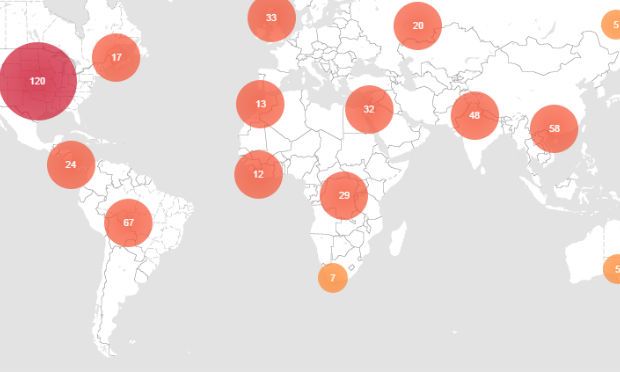emerging infectious diseases
See the following -
A Major Lesson from Ebola: Pandemics Are Strongly Driven by Inequality
 After more than a year since the Ebola pandemic appeared in West Africa, Liberia – one of the worst hit countries – has been declared free of the virus. However, the initial global response was not encouraging. Despite having the knowledge and technology needed to contain the outbreak, help was initially sluggish and poorly effective. This situation illustrates one of the major lessons from the history of pandemics: that they are strongly influenced by health inequalities. Pandemics are epidemics that spread widely and cross borders. In many respects, the world is a safer place for those concerned about these emerging infectious diseases – advances in science, particularly molecular biology, information technology, and epidemiology give us unprecedented tools for understanding, tracking and managing emerging threats...
After more than a year since the Ebola pandemic appeared in West Africa, Liberia – one of the worst hit countries – has been declared free of the virus. However, the initial global response was not encouraging. Despite having the knowledge and technology needed to contain the outbreak, help was initially sluggish and poorly effective. This situation illustrates one of the major lessons from the history of pandemics: that they are strongly influenced by health inequalities. Pandemics are epidemics that spread widely and cross borders. In many respects, the world is a safer place for those concerned about these emerging infectious diseases – advances in science, particularly molecular biology, information technology, and epidemiology give us unprecedented tools for understanding, tracking and managing emerging threats...
- Login to post comments
Accelerating Identification and Tracking of Pandemic Disease Outbreaks
 A national biosurveillance program requires the collaboration of multiple federal, state and local agencies to provide a comprehensive view of a health-related event. Bitscopic's Praedico™ biosurveillance platform breaks down the data barriers among organizations with an extensible architecture that can incorporate any kind of data. The platform also delivers high performance by incorporating the latest technologies such as big data, NoSQL databases, and machine learning. Read More »
A national biosurveillance program requires the collaboration of multiple federal, state and local agencies to provide a comprehensive view of a health-related event. Bitscopic's Praedico™ biosurveillance platform breaks down the data barriers among organizations with an extensible architecture that can incorporate any kind of data. The platform also delivers high performance by incorporating the latest technologies such as big data, NoSQL databases, and machine learning. Read More »
- Login to post comments
Pandemic and all-hazards preparedness, response law emboldens U.S. disaster recovery efforts
 The Pandemic and All-Hazards Preparedness and Advancing (PAHPA) Innovation Act, S. 1379, became law on Monday with the president's signature, prompting accolades from national stakeholders, company executives and federal lawmakers. The far-reaching law ensures the United States will be better prepared to respond to a wide range of public health emergencies, whether man-made or occurring through a natural disaster or infectious disease. Overall, the law aims to bolster the nation's health security strategy, strengthen the country's emergency response workforce, prioritize a threat-based approach, and increase communication across the advanced research and development of medical countermeasures (MCMs), among numerous provisions contained in the law.
The Pandemic and All-Hazards Preparedness and Advancing (PAHPA) Innovation Act, S. 1379, became law on Monday with the president's signature, prompting accolades from national stakeholders, company executives and federal lawmakers. The far-reaching law ensures the United States will be better prepared to respond to a wide range of public health emergencies, whether man-made or occurring through a natural disaster or infectious disease. Overall, the law aims to bolster the nation's health security strategy, strengthen the country's emergency response workforce, prioritize a threat-based approach, and increase communication across the advanced research and development of medical countermeasures (MCMs), among numerous provisions contained in the law.
- Login to post comments
Using Crowdsourcing to Track the Next Viral Disease Outbreak
 Last year's Ebola outbreak in West Africa killed more than 11,000 people. The pandemic may be diminished, but public health officials think that another major outbreak of infectious disease is fast-approaching, and they’re busy preparing for it. Boston public radio station WGBH recently partnered with The GroundTruth Project and NOVA Next on a series called “Next Outbreak.” As part of the series, they reported on an innovative global online monitoring system called HealthMap, which uses the power of the internet and crowdsourcing to detect and track emerging infectious diseases, and also more common ailments like the flu.
Last year's Ebola outbreak in West Africa killed more than 11,000 people. The pandemic may be diminished, but public health officials think that another major outbreak of infectious disease is fast-approaching, and they’re busy preparing for it. Boston public radio station WGBH recently partnered with The GroundTruth Project and NOVA Next on a series called “Next Outbreak.” As part of the series, they reported on an innovative global online monitoring system called HealthMap, which uses the power of the internet and crowdsourcing to detect and track emerging infectious diseases, and also more common ailments like the flu.
- Login to post comments
Using the Latest Advances in Data Science to Fight Infectious Diseases
 One of the most dramatic shifts in recent years that is empowering epidemiologists to be more effective at their jobs is occurring due to improvements in data technologies. In the past, the old "relational" data model dictated that data had to be highly structured, and as a result treated in distinct silos. This made it difficult, if not impossible, to analyze data from multiple sources to find correlations. Epidemiologists would spend many minutes or even hours on each query they ran to get results back, which is unacceptable when you need to test dozens of hypotheses to try to understand and contain a fast-moving outbreak. (Imagine how you would feel if each one of your Google searches took 45 minutes to return!) By contrast, using newer technologies, the same queries on the same hardware can run in seconds. Read More »
One of the most dramatic shifts in recent years that is empowering epidemiologists to be more effective at their jobs is occurring due to improvements in data technologies. In the past, the old "relational" data model dictated that data had to be highly structured, and as a result treated in distinct silos. This made it difficult, if not impossible, to analyze data from multiple sources to find correlations. Epidemiologists would spend many minutes or even hours on each query they ran to get results back, which is unacceptable when you need to test dozens of hypotheses to try to understand and contain a fast-moving outbreak. (Imagine how you would feel if each one of your Google searches took 45 minutes to return!) By contrast, using newer technologies, the same queries on the same hardware can run in seconds. Read More »
- Login to post comments
White House Call to Action to the Tech Community on New Open Access Machine Readable COVID-19 Dataset
 Today, researchers and leaders from the Allen Institute for AI, Chan Zuckerberg Initiative (CZI), Georgetown University's Center for Security and Emerging Technology (CSET), Microsoft, and the National Library of Medicine (NLM) at the National Institutes of Health released the COVID-19 Open Research Dataset (CORD-19) of scholarly literature about COVID-19, SARS-CoV-2, and the Coronavirus group. Requested by The White House Office of Science and Technology Policy, the dataset represents the most extensive machine-readable Coronavirus literature collection available for data and text mining to date, with over 29,000 articles, more than 13,000 of which have full text.
Today, researchers and leaders from the Allen Institute for AI, Chan Zuckerberg Initiative (CZI), Georgetown University's Center for Security and Emerging Technology (CSET), Microsoft, and the National Library of Medicine (NLM) at the National Institutes of Health released the COVID-19 Open Research Dataset (CORD-19) of scholarly literature about COVID-19, SARS-CoV-2, and the Coronavirus group. Requested by The White House Office of Science and Technology Policy, the dataset represents the most extensive machine-readable Coronavirus literature collection available for data and text mining to date, with over 29,000 articles, more than 13,000 of which have full text.
- Login to post comments
Will Flooding in Texas Lead to More Mosquito-Borne Illness?
The devastating floodwaters from Hurricane Harvey will damage many human habitats, but after the flood recedes, the waterlogged city may become a more welcoming habitat for mosquitoes. And that means that residents already made vulnerable by the hurricane might also eventually be at increased risk for mosquito-borne diseases like West Nile virus and Zika. West Nile virus has been endemic in Texas since 2002. In 2016, the state had 370 cases; so far in 2017, there have been 36 confirmed cases. Harris County, where Houston is located, has seen cases of West Nile in humans this year, and detected the virus in local mosquitoes...
- Login to post comments